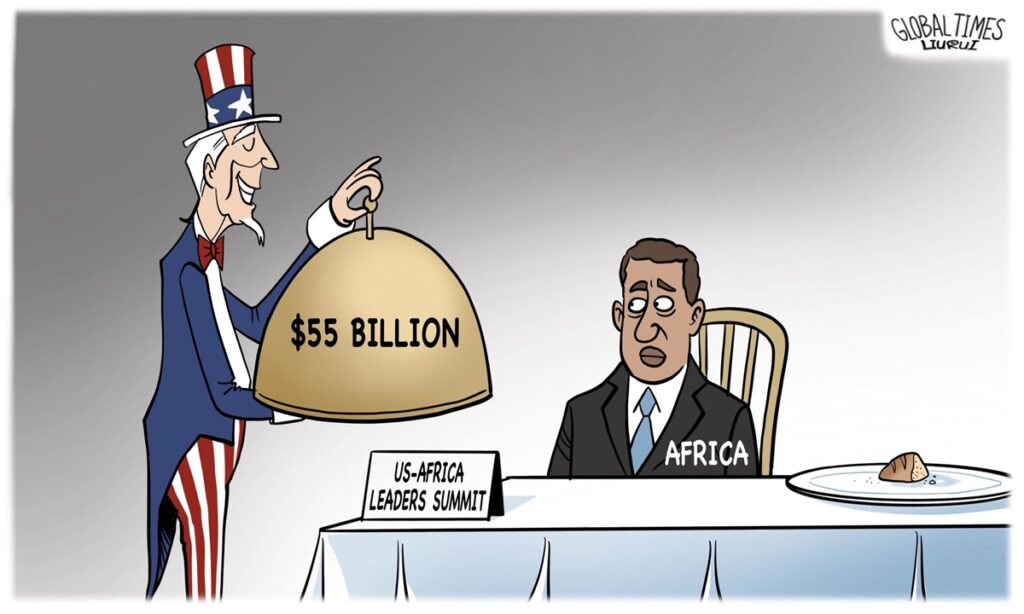The second US-Africa Leaders Summit kicked off on Tuesday in Washington and will last for three days. The US-based Foreign Policy magazine reported that “Team Biden wants to court African nations without talking about Beijing.” But this was broken on the first day. At a panel discussion with several African leaders, US Defense Secretary Lloyd Austin said China was expanding its footprint in Africa “on a daily basis” through its growing economic influence, which will “destabilize” the continent.
African countries have been wearied of US’ various remarks aiming to sow discord. This time, coming all the way to the US, the leaders of 49 countries and the African Union are not to have dinner at the White House, not to be lectured by Americans, nor to hear Americans bad-mouthing China. As a matter of fact, they have clearly shown their reluctance and aversion towards the pressure piled on them to take sides, and ask the US to respect them.
The day ahead of the summit, the US pledged to provide $55 billion to Africa over the course of the next three years in economic, health and security support for Africa. Then, the US announced an expansion of its cooperation and capabilities in outer space to include some African countries. It is reported that during the summit, President Joe Biden will declare US support for the African Union’s admission to the G20. These are of course good things. Now that the US has made so many promises, it should focus on fulfilling it.
China is willing to see more countries, including the US, offer sincere help to Africa, as the saying goes, “the more the better.” African countries also are eager to seek strong support and assistance to deal with the food crisis, financial crisis, and fiscal crisis in the post-pandemic era. In this regard, there are many things the US can, needs and should do. But what’s concerning is if the US will play the “lip service” trick once again.
The first US-Africa Leaders Summit was held eight years ago during the Obama administration. The two summits were separated by not only eight years, but also a US president who insulted African countries as “shithole,” which has become a historical witness of US’ capriciousness and disrespect for Africa.
The Power Africa initiative, which was proposed during the Obama administration, has only completed about 25 percent of the total. Now that the Biden administration wants to regain the trust of Africa, it must first repay these debts.
The US has made its Africa strategy a Gordian knot. It has set its goal to prevent China’s development in the African continent instead of helping African countries cope with development difficulties, which fundamentally goes against the wishes of African countries and damages their interests. In other words, the US wants to let African countries pry away the bricks of the projects built with China’s aid, by only painting a few pieces of cake.
In the past, the US regarded the African continent as a problem that it disliked and needed to be solved, but now it regards Africa as a pawn in the major power competition. It never really regards Africa as a cooperative partner of equality, mutual benefit and mutual respect. Not only African countries have been keenly aware of this, but the international community also sees it clearly.
The African people still have fresh memories of the proxy wars waged by the US and the Soviet Union in Africa during the Cold War, making them deeply guard against big power competition. With the world becoming more multipolarized, they are even more opposed to and resistant to be regarded as a pawn in the strategy of major countries.
The US Strategy toward Sub-Saharan Africa released in August mentioned China three times, all of which described China in a negative context, arousing extensive dissatisfaction in Africa. A well-known South African scholar bluntly pointed out that this strategy is “thoroughly unremarkable strategy that came across as the latest in a long list of paternalistic lectures the US and the broader West have given Africa on how to run its affairs.” And it seems that Washington “has not read the African mood very well.”
African countries hope to build good relationship with the US, but they don’t want to achieve it at the cost of China-Africa development and cooperation. China is Africa’s largest trading partner, with trade volume reaching $254 billion in 2021, which is four times that of US-Africa trade. China is also one of the countries with the largest investment to Africa, bringing millions of job opportunities to the continent. Hospitals, highways, airports, stadiums which are built with Chinese aid are all over Africa. The US can be like China and do more practical things for African people. If the US-Africa Leaders Summit can be held around this theme, it will be welcome by everybody.
(Global Times)




